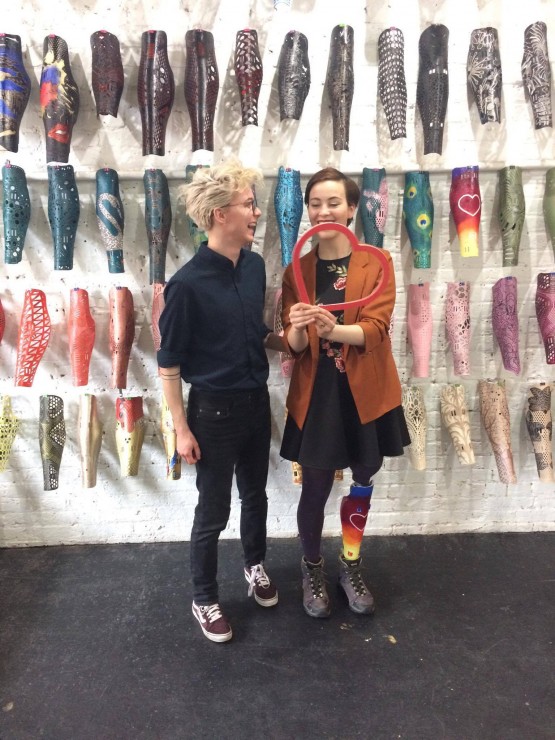
Gabrielle Fitzpatrick (left) and Emery Vanderburg (right) are the founders of Ampuseek, a non-profit organization advocating for amputees. They recently hosted an event on March 26 (pictured). Photo provided
For some, the University of Victoria may not be the first place that springs to mind when amputee advocacy is brought up, but two second-year UVic students are taking the world of non-profit by storm.
Emery Vanderburgh and Gabrielle Fitzpatrick are the founders of Ampuseek, a non-profit organization that seeks to “make prosthetic care more accessible in Canada, and to bring coherence to the systems which support it,” according to their website.
“We want to do amputee advocacy in a positive and confident way,” says Vanderburgh.
Inspiration for Ampuseek came from the shock of how difficult it was for Vanderburgh to get funding for her own high-tech prosthetics, and the realization that this was the case for most amputees in Canada.
In April of last year, Vanderburgh and Fitzpatrick travelled to two major manufacturers of prosthetics — Össur (Iceland) and Otto Bock (Germany) — to explore the impact that the companies’ monopolies on the prosthetics market has had on amputees across the world. Having returned to Victoria, they’re focusing on spreading their message both in person and through social media.
“I think that there’s a lot of misconceptions about disabilities, and that it’s extraordinarily important to be informed so that people are educated about how to talk about it,” says Vanderburgh.
“[Ampuseek wants] to continue creatively showing our insights and working to improve how disability is viewed. We’re also putting together some first-hand experience lead guides. For example, how to navigate taxes or MSP [Medical Services Plan] as an amputee.”
“It’s about the everyday things,” Fitzpatrick adds. “Disability plays a role in everyone’s lives, whether you’re the one directly affected by it or not.”
“Funding for prosthetics poses the biggest problem,” Vanderburgh explains. “You have to look into federal funding based on workers comp or aboriginal status, as well as your provincial health care, your insurance, and charitable organizations like the War Amps.
“It’s a long process to do just one, and most amputees have to explore all avenues to find something that can get them a limb. If all else fails (or if your prosthetic is too expensive) you have to pay out of pocket for your device.”
Ampuseek’s current project, the So Much More series — an Instagram-based collaboration with local photographers and amputees — was kickstarted in late March of this year.
“The goal of the So Much More series,” Vanderburgh says, “is to start a discussion on why it seems necessary in media to have a disclaimer on how someone became—or is—disabled, even if what they are doing is related to disability advocacy. To me, it’s cheap to use someone’s story as clickbait drama, and I think it further perpetuates a stigma of disability.”
She adds, “I think sharing your story is important on your own terms without feeling obligated and without that story overshadowing your other accomplishments. It’s about bringing it back to the human level, and stopping inaccurate or even dehumanizing portrayals of amputees.”
Ampuseek is putting out the call for local amputees to send them a photo and write-up if they’re interested in volunteering for the series. “We always have a few projects on the go,” says Vanderburg. The pair hosted an ‘Insta-meet’ on March 26 with design studio Alleles, which provides cosmetic options for prosthetics, and are altering clothes to better fit amputees for a giveaway
Ampuseek is also in phase one of a three-step process, which involves creating a database for amputees looking for information on prosthetics, and simplifying the ordeal of finding funding for what are often expensive yet life-changing devices. The second and third phases involve providing and implementing solutions to the current disorder and inconvenience that amputees must face in finding prosthetics.
When asked about what the university can do to contribute to Ampuseek’s cause, Fitzpatrick says UVic can “keep being an enthusiastic community. It’s why we love the school so much. The Business department has already let us do a showcase for Ampuseek in a professional setting, which has been a huge help.”
Moving forward, Fitzpatrick and Vanderburgh plan on furthering their research and synthesizing their database of information for amputees looking for help. “We will continue . . . to speak to government, insurance companies, and manufacturers on how we can implement the solutions [we are working towards]. We hope to stress the need for more studies on the amputee population and work toward an official review of how prosthetics are made available [in Canada].”
April will mark the organization’s one-year anniversary, and Vanderburgh and Fitzpatrick haven’t slowed down yet. Their positivity is relentless, and with such a bright future for Ampuseek ahead, it’s clear why.
For more information on Ampuseek, check out their website at ampuseek.com.








